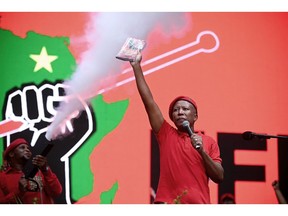Article content
(Bloomberg) — The Economic Freedom Fighters, South Africa’s third-largest political party, called for an overhaul of central bank policy and higher corporate taxes in a campaign manifesto released in anticipation of this year’s national elections.
Most opinion polls predict the party will garner less than a fifth of the vote, making it unlikely the EFF will form the next government. That didn’t stop party leader Julius Malema from unveiling an ambitious plan to more than 50,000 people at the Moses Mabhida stadium in the eastern city of Durban on Saturday.
Article content
He committed to ending the nation’s long-running electricity crisis within six months by reactivating all of South Africa’s coal-fired power plants and developing nuclear energy, and promised the creation of 9 million new jobs, including through the formation of a state-owned security company.
“We are going to take the land and we are not going to pay a cent,” Malema said, reiterating the party’s long-standing position. The party plans to resubmit a proposal to amend the constitution to allow for land to be expropriated without compensation, he said.
The latest polls indicate that the ruling African National Congress is likely to lose its majority, and that the EFF’s share of the vote is poised to increase from the 10.8% it won in 2019. Some surveys suggest that Malema’s party even stands an outside chance of displacing the Democratic Alliance as the biggest opposition party.
President Cyril Ramaphosa has yet to declare a date for the election, which must be held by mid-August.
Should the ANC fall just shy of half the vote in the election, it will probably form a governing coalition with one or more minor parties. If it garners about 45% or less, it would have to enlist the support of one of its main competitors and that would place the EFF into contention as a partner, since the DA and 10 other parties have entered into an alliance and pledged not to work with the ANC.
Article content
Investors and business leaders are concerned about the prospect of the EFF being part of the government, given its populist policy proposals, which include increasing the role of the state in the economy, raising additional public debt, and increasing taxes.
The EFF’s populist rhetoric and confrontational style — its lawmakers have disrupted proceedings in parliament and brawled with security officers — have found resonance among many poor, Black township residents, whose living standards remain dismal 30 years after the end of apartheid.
Its 258-page manifesto outlines the party’s policies, including regular audits of the central bank to ensure compliance with “national economic policies,” along with the nationalization of the institution. South Africa’s central bank is one of the few in the world still owned by private shareholders, who vote to appoint seven of the bank’s 10 non-executive directors and have no say over policy.
The EFF would also introduce legislation prohibiting the employment of former central bank governors and deputy governors at commercial lenders and other institutions under the central bank’s supervision.
Article content
“This measure is aimed at preventing conflicts of interest and ensuring the integrity and financial regulatory practices,” the party said.
The party also proposed a tiered system of taxes for foreign investors, with “higher rates for short-term speculative investments and lower rates for long-term, sustainable investments.”
Zuma Critic
Malema, who led the ANC’s youth wing before being expelled from the party for criticizing then-President Jacob Zuma, founded the EFF in 2013. The party later instituted a landmark legal case against Zuma for accepting upgrades at his personal home at taxpayers’ expense, a challenge that resulted in the nation’s top court finding that the president had violated his oath of office, and invigorating a groundswell of nationwide protests against Zuma, who was forced to resign in 2018.
Other plans in the EFF’s manifesto include:
- Creating a state-owned company to operate all coal mines owned by state power utility Eskom Holdings SOC Ltd., would could export surplus coal to generate revenue.
- The termination of existing contracts with independent power producers and an end to the roll-out of new projects.
- An EFF government would support the involvement of the private sector in electricity generation, aiming for the participation of 30% to 40% in new generation capacity.
- Increasing corporate income tax from 28% to 32%, and introducing a 25% dividend tax.
Share this article in your social network

